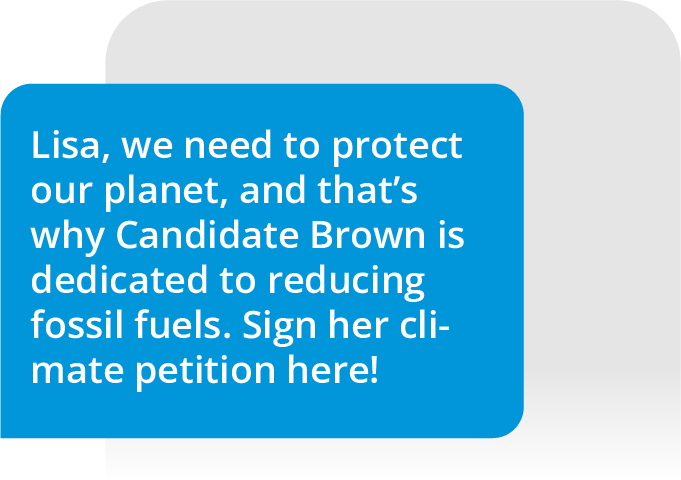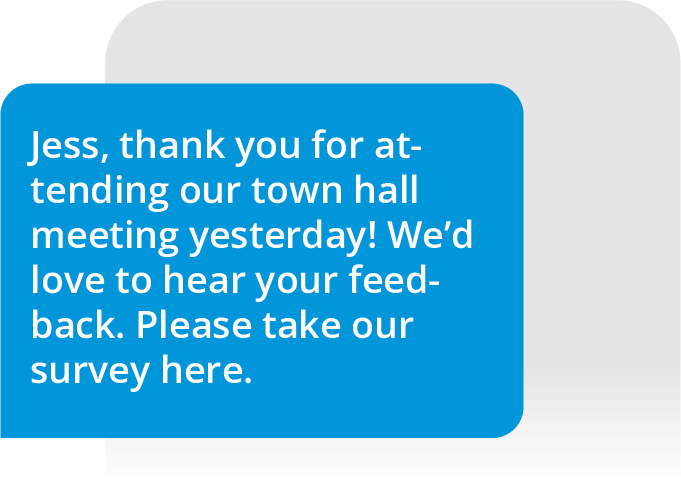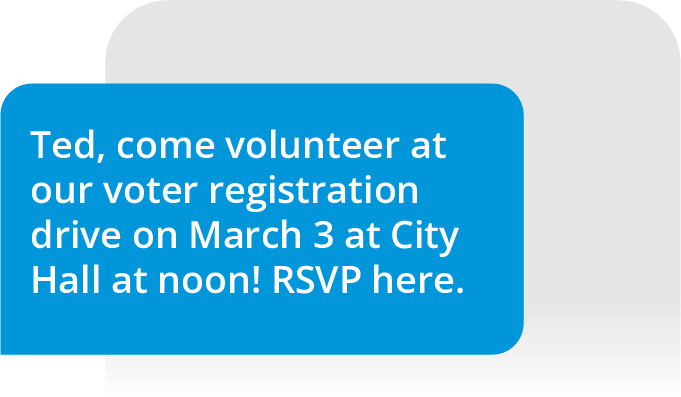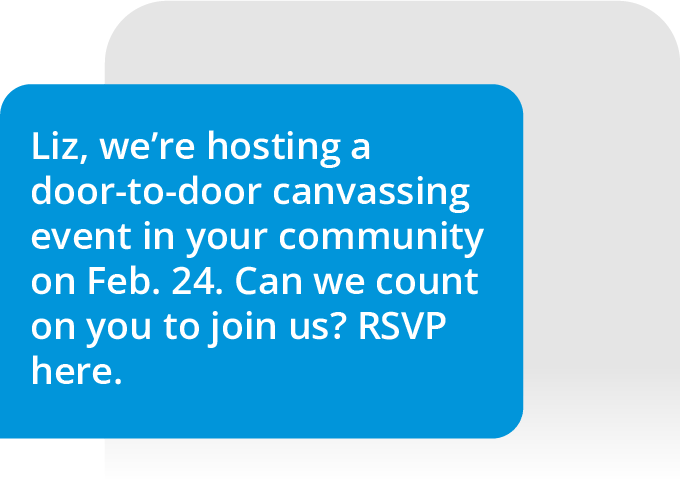Personalization in Political Texting: The Power of a Personal Touch
Find out how personalized political text messages can help improve voter engagement.

When creating a political campaign communication plan, including an SMS strategy is crucial. After all, SMS texts provide one of the most effective ways of reaching your voters compared to other forms of outreach like email marketing.
In fact, SMS messages have an impressive 98% open rate, and 70% of texts are opened within just five minutes. Meanwhile, email marketing only has an 18% open rate, and just 19% of those emails are opened upon arrival.
That doesn’t mean you should ditch your other marketing efforts in favor of SMS messaging. It just means you should use SMS marketing combined with your other strategies to help you connect with your voters.
So, how do you create the most effective and engaging political text messages that will resonate with your voters? The key is personalization.
Personalization in Political Texting
Before we begin to unpack everything there is to know about personalizing your political texts, let’s ensure you understand what we mean when we refer to political text messages in the first place.
Understanding Political Text Messaging
Political text messages are SMS messages that are sent to voters or potential voters. These messages include information about political parties and candidates but can also provide important details regarding voter registration, Election Day, voting deadlines, and polling locations. Furthermore, these SMS messages might cover volunteer opportunities, campaign events, and donations. You can use political text messages to inspire, educate, and motivate your voters to take action.
Now, let’s move on to the topic of personalization. Personalizing your political text messages will make them stand out from the rest. Personalization can help grab voters’ attention, pique their interests, and encourage engagement. In other words, personalizing your political texts can help prevent your votes from ignoring and deleting your messages.
The Importance of Personalization
Why is personalization so important in political texting? Personalization is important in political texting because it shows you understand your voters, leading to deeper engagement and higher response rates. When you craft personalized political text messages, you can include information about the individual voter’s interests, motivations, and concerns.
For instance, you can include their names, references to political causes they’ve shown interest in, and announce events that are taking place in their region.
What’s more, personalizing your text messages demonstrates that you’ve gone the extra mile, taking the time to customize the message so that it appeals to your individual voters. It shows you’ve researched, which can help build trust and strengthen your relationship with your voters.
Why Generic Texts Fall Short in Political Campaigns
What’s so wrong with a generic political text message? Generic political texts tend to miss the mark because they lack emotional connection. When you don’t tailor your messages to your individual voters, it’s clear that you’re just sending a boilerplate copy to the masses.
You see, sending a generic text is like shouting a message through a megaphone, while sending a personalized text is like picking up the phone and calling a person on their cell phone. Delivering a generic message through that megaphone will make your voters feel like they’re in a sea of others, making them feel disconnected from communicating with you. But if you take the time to dial that person’s number, call them by their name, and deliver a personal message, they’re more likely to feel seen and heard.
To further explore the different sentiments of a generic vs. personalized text, let’s take the politics out of it.
Let’s say you received one text that reads, “Hey, what’s up?” and another that says, “Hi, Mark! How did your presentation go at work today?”
Which one would you feel more inclined to respond to? Chances are, you’d engage with the more personalized text that includes your name and a reference to something personal about you—And the same is true for a personalized text regarding politics.
Effortless Political Texting Starts Here
Every contact counts! Gather, segment, and reach them all year.
Unlocking the Potential of Personalized Texting
The good news is that creating personalized political text messages isn’t difficult. It’s just a matter of understanding some of the best practices and navigating this strategy.
Strategies for Effective Personalization
What are some ways to personalize text messages for voters? Some effective ways to personalize text messages for voters include using voter data, incorporating dynamic content, and engaging in two-way communication.
Using Voter Data
The data you collect from your voters can arm you with information for personalizing your messages. For example, their demographics and personal preferences provide insight into your voters’ age, location, income, and interests.
You may have collected other voter data that can be relevant to your SMS marketing strategy, too.
For instance, you might have records showing that they volunteered at your canvassing event last year or donated to your campaign for the past few years. This data shows their level of involvement in your campaign and suggests they may be willing to engage again. Knowing this can help you create tailored messages encouraging them to volunteer or donate more often.
Understanding Micro-Targeting
You can also use voter data to micro-target your voters, segmenting them to create customized messages that appeal to them and may influence their actions.
How can micro-targeting enhance political SMS campaigns? Micro-targeting can enhance political SMS campaigns by allowing you to send highly specific messages to smaller groups of voters who share similar characteristics. This helps you create more relevant content that is more likely to resonate with your voters.
Let’s say you’re hosting a political rally in San Diego. If you know your voters’ zip codes, you could send a tailored SMS message to all your voters in the surrounding San Diego region. You could even expand it to your Orange County and Los Angeles voters, too, because their locations are not too far of a drive from America’s Finest City.
Of course, targeting your audience this way makes way more sense than sending a mass text to all your California or West Coast voters, as some might live hundreds of miles from the rally location, making that message irrelevant to them. And if you send too many irrelevant messages to your voters, they might begin ignoring your messages or, worse, decide to opt-out from receiving them altogether.
Incorporating Dynamic Content
Using dynamic content is another way to personalize your political text messages. This involves incorporating dynamic data, such as your voter’s name, location, or recommendations based on their voting history or behavior. Dynamic data can also provide relevant info, like changes to a polling location, reminders about polling closing times, or real-time campaign updates.
Encouraging Two-Way Communication for Personalization
There are also marketing tactics you can deploy now that can help you personalize your communication down the road.
For example, you can have two-way conversations with your voters via text by encouraging them to respond to your poll or asking them to complete a survey. These interactions can provide you with feedback, which can turn into helpful data to include in your future messages. Suppose your voter responded to a poll saying they’d like to know more about your candidate’s tax initiatives. In that case, you can include that voter in text messages with tax-related updates.
Examples of Powerful Personalized Texts
By now, you understand what it means to personalize your political texts, but you might need some examples to help see it in action.
What are some examples of effective personalized text messages for voter engagement? Some examples of effective personalized text messages for voter engagement include those with calls to action, invitations, and updates.
For inspiration, check out some of our personalized SMS outreach for voter engagement message samples below:
Personalized Calls to Action
Every SMS message you send should always include a call to action, but there are ways of making them ultra-personalized, too. As a reminder, a call to action refers to the desired action you want your voters to take, such as clicking on a link or signing up for something.

For example, let’s say your voter data shows you have a group of voters who recently attended a climate rally. In this case, you could send them a personalized political text asking them to sign your candidate’s climate petition. Your text could say, “Lisa, we need to protect our planet, and that’s why Candidate Brown is dedicated to reducing fossil fuels. Sign her climate petition here!”

You could also use a personalized call to action to request feedback from your voters about their recent engagement with your campaign. In this case, you could craft a personalized message saying, “Jess, thank you for attending our town hall meeting yesterday! We’d love to hear your feedback. Please take our survey here.”
These political text messages are personalized by including voters' names and references to their preferences or recent behaviors.
Personalized Invitations
Personalized invitations to rallies, debates, volunteer opportunities, registration drives, and GOTV events are great ways to mobile your voters and increase excitement around your campaign. You can even include RSVP options, event updates, and reminders to keep your voters engaged.

A personalized SMS outreach for voter engagement message sample with an invitation might say something like, “Ted, come volunteer at our voter registration drive on March 3 at City Hall at noon! RSVP here.”

Or, you could send a personalization invitation that reads, “Liz, we’re hosting a door-to-door canvassing event in your community on Feb. 24. Can we count on you to join us? RSVP here.”
In these examples, the voter’s name and references to events in their community make them more personalized than a generic message.
Personalized Updates
Providing personalized updates is another way of interacting with your voters while offering helpful updates about the campaign, registration, Election Day, and more.
For example, maybe you want to send your voters updates regarding polling locations and hours of operation during Election Day. After all, this is a great way to motivate your voters to get out and vote.
Therefore, you might send a personalized political text that says, “Happy Election Day, Jo! Your polling location is at the VA Library. The polls are open from 7 am to 7 pm. “ And later in the day, you might send a follow-up text saying, “Jo, it’s not too late to vote! Your polling location (VA Library) is open for three more hours. Polls close at 7 pm.”

Again, including their name and relevant information pertaining to the voter makes these messages more engaging and informative.
Measuring the ROI of Personalized Texting
Measuring the ROI of text-based voter mobilization campaigns is essential to understand their performance.
How can you measure the ROI of your personalized texting campaign? You can measure the ROI of your personalized texting campaign by tracking key metrics, such as your open rates, click-through rates, and engagement rates. For example, you may see a spike in opt-out requests, suggesting your voters aren’t happy with your outreach efforts. Or perhaps you’re seeing an increase in click-through rates, which tells you you’re doing something right.
However, you should also look at other data, such as volunteer sign-ups, donations, and voter turnout. This information can help you determine what efforts are working well and which ones need tweaking.
When reviewing your analytics, compare your results to control groups to see the bigger picture. Use these insights to inform your future SMS campaigns.
Ethical Considerations and Best Practices
As with sending any kind of SMS message, knowing best practices and regulations is important. This can help you avoid fines and lawsuits but also help you stay in the good graces of your voters.
Now, what are some ethical considerations when personalizing political text messages? Some ethical considerations when personalizing political text messages include being transparent and complying with the marketing rules and regulations.
Transparency
Practicing transparency is one of the best practices and ethical considerations when crafting personalized text messages. This means being honest and upfront about who the messages are coming from and how you collect and use voter data. This can help you earn trust and build relationships with your voters, making them more inclined to interact and engage with your SMS content.
Comply with Marketing Regulations
Before sending a single SMS message, familiarize yourself with the CAN-SPAM Act and the Telephone Consumer Protection Act (TCPA), which oversees marketing communication.
To comply with these marketing regulations, provide opt-in and opt-out options for your voters. When your voters opt-in, they agree to receive text communication and permit you to send them SMS texts. The opt-out option removes your voters from your subscription list and prevents you from contacting them via SMS texts.
Now, you might ask yourself, how can you ensure GDPR compliance for your SMS outreach? GDPR refers to the European Union’s privacy regulations. If your text messages fall under this jurisdiction, you must protect the data and privacy of your voters. This requires you to understand rules around collected data, data breaches, and the transferring of data.
Personalized Texting in an Omnichannel Strategy
As we previously mentioned, creating a political campaign communication plan that incorporates SMS texting with other outreach strategies is best because it helps you reach more voters and increases engagement.
So, how does personalized texting fit into an omnichannel communication strategy? Your personalized texting fits into an omnichannel communication strategy because you can use it with other channels, such as email, social media, TV and radio ads, and even in-person campaigning. Instead of relying on one outreach strategy, you can use them simultaneously to expand your reach.
For instance, if your voters don’t check their emails very often, they won’t see your campaign-related emails, but if they’re always on their cell phones, there’s a good chance they’ll see your political texts hit their inboxes. An omnichannel communication strategy with email and text marketing provides you with a more well-rounded approach to getting your content in front of your voters. After all, if your voters miss your outreach efforts on one channel, they’ll probably see them on another.
The Future of Personalized Political Texting
It’s important to stay updated with the latest trends to help ensure you and your voters get the most out of your SMS marketing communication.
That said, what are the future trends in personalized political texting? Some future trends in personalized political texting involve using AI-powered insights and deeper voter data integration.
For example, AI can help you track voter behavior via their clicks, comments, online searches, and comments, which allows you to gather valuable data. AI can also incorporate predictive analytics to further understand voters’ needs and habits. This advanced technology can help influence your content and make your content more appealing and engaging to your voters.
With that in mind, what about chatbots? Can chatbots be used for personalized political texting? Yes, chatbots can be used for personalized political texting as they can use conversational texting to oversee basic inquiries, gather preferences, monitor behaviors, and redirect voters to relevant resources. Chatbots can also use previously gathered data and insights to further personalize their communication with voters.
Ready to Connect with Voters on a Personal Level?
If you’re ready to personalize your SMS texts, it’s time to learn more about EZ Texting. Our SMS messaging platform provides all the tools you need to personalize your text communication with your voters. Whether you want to inspire, educate, or urge your voters to get out and vote, EZ Texting can help you reach your voters. Sign up for our 14-day trial today to try it out for free!
Effortless Political Texting Starts Here
Every contact counts! Gather, segment, and reach them all year.
See other resources related to:

